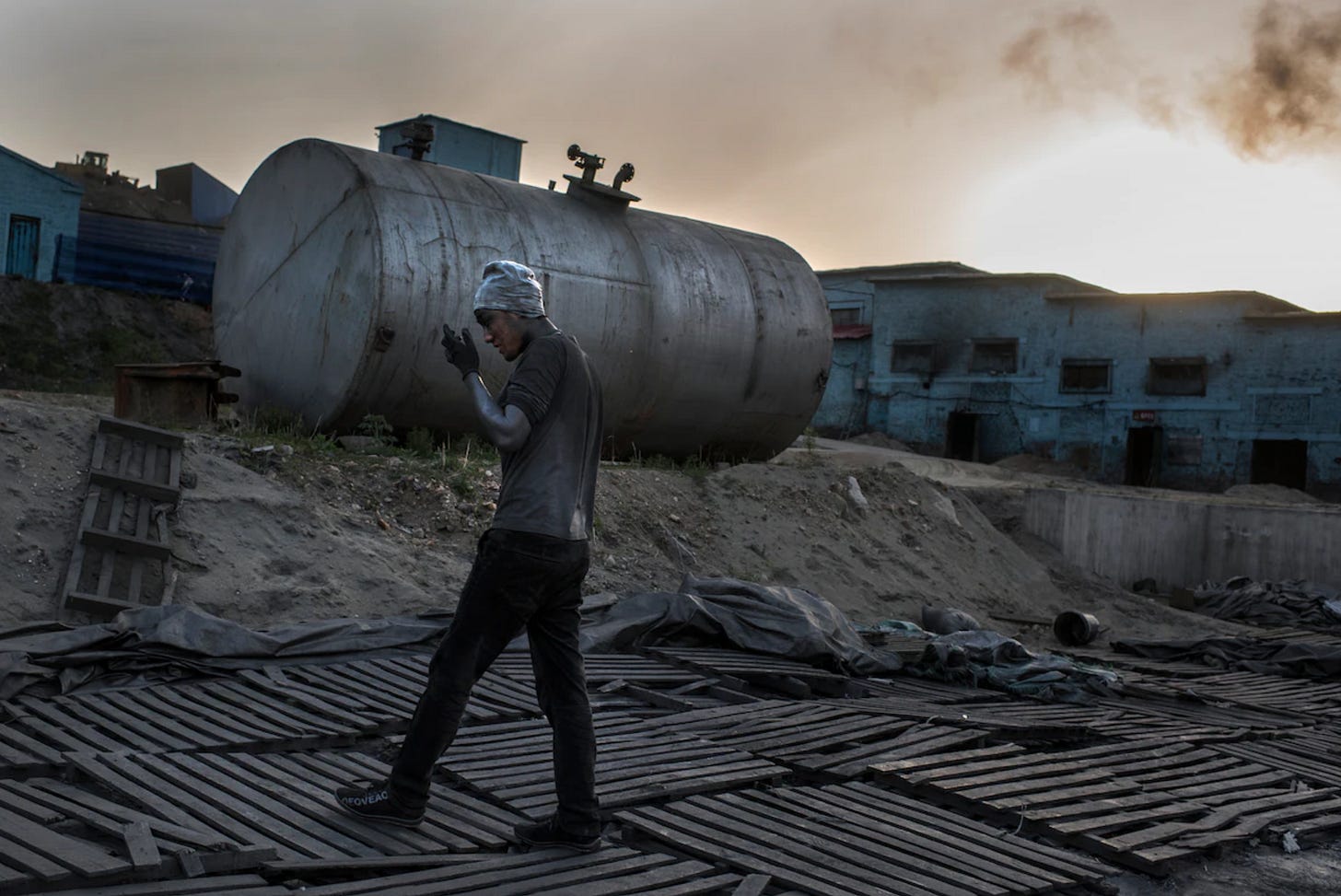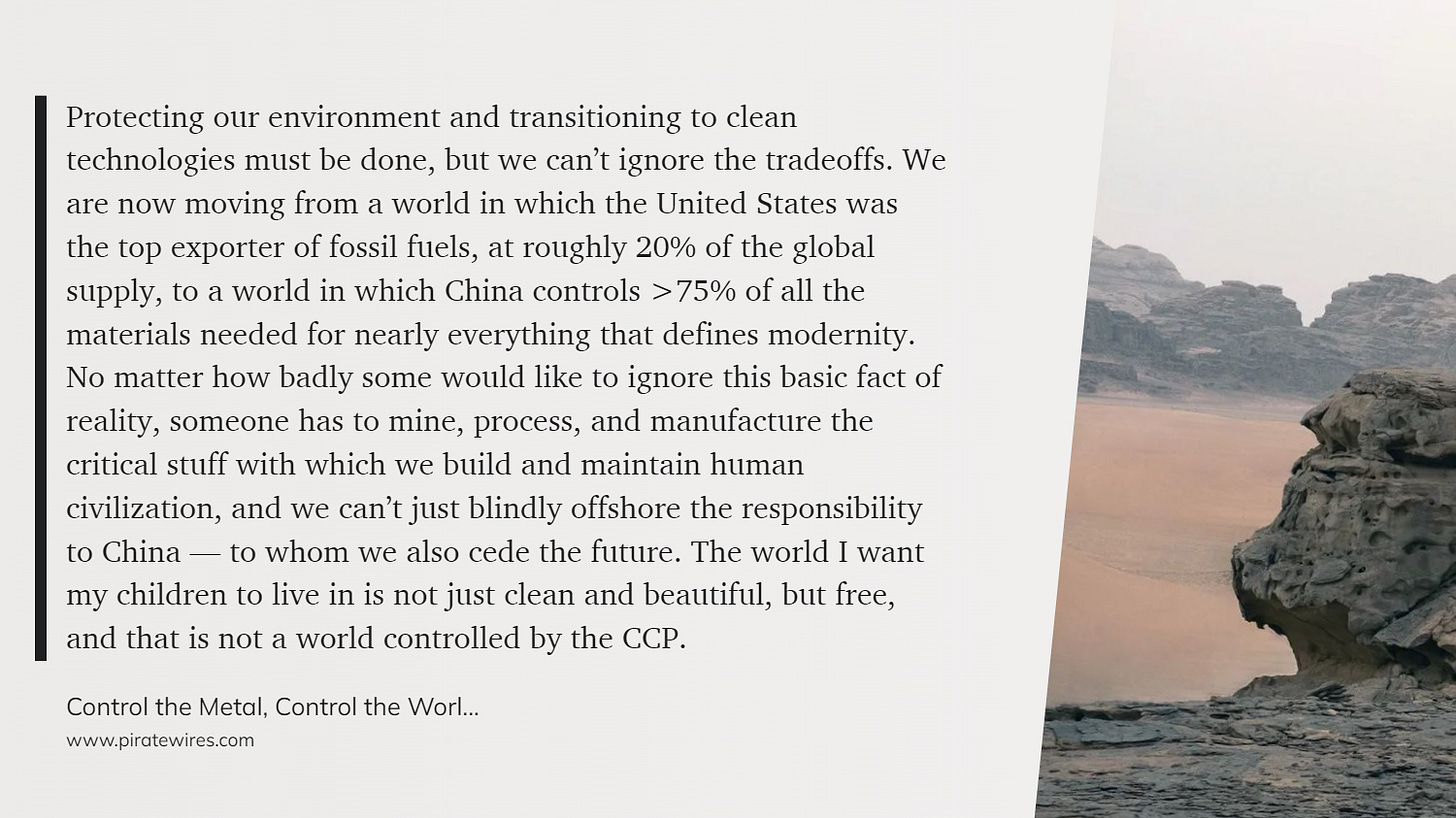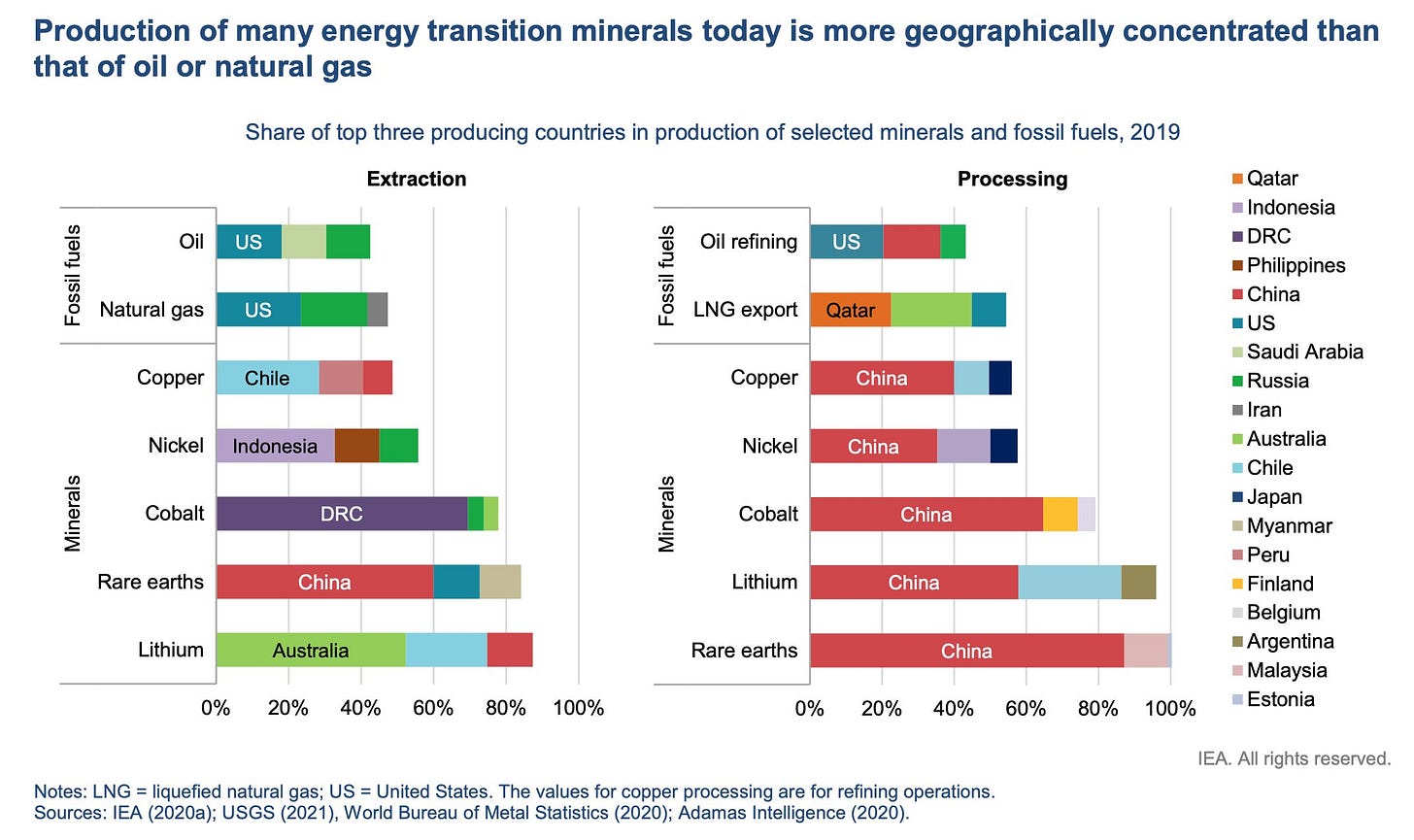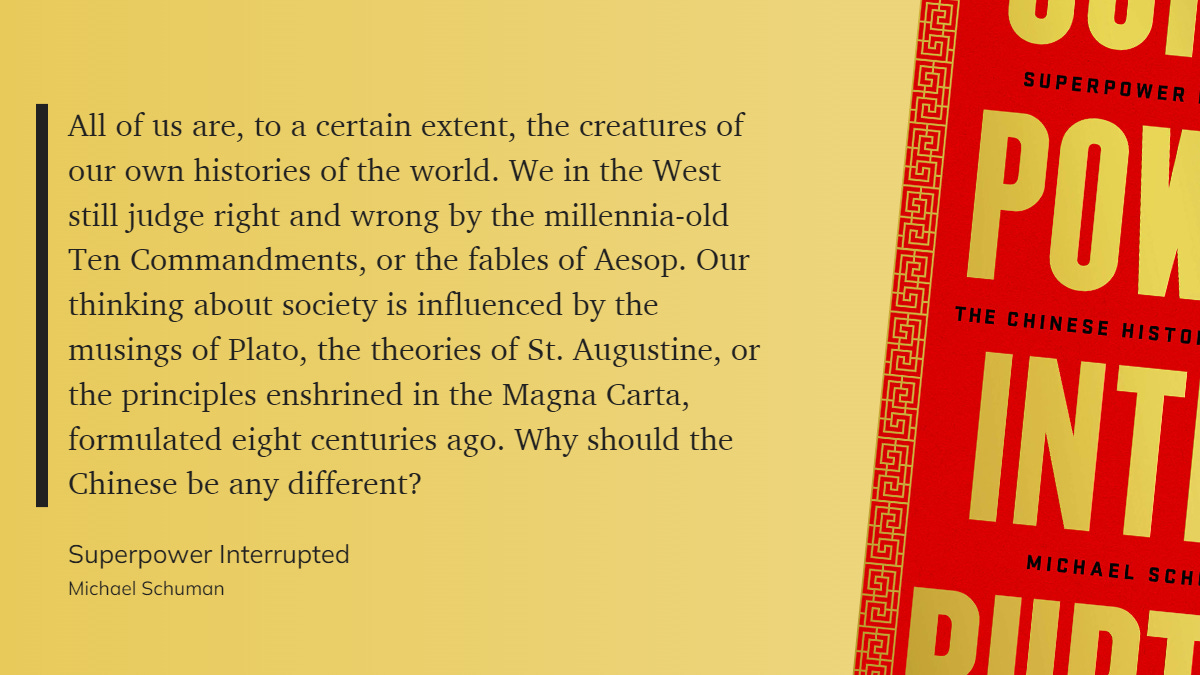Tapestries-48 | Chinese orbits
August 13; looking at the resources, history and technology underpinning China's future, and by extension, ours too.
Hey fam, I received a lot of responses to last edition’s piece about consuming and experiencing art. One friend in particular told me about a gallery with monumental Water Lilies from Monet in Japan, which sounds like the absolute opposite to my experience (link below)! Keep the feedback and engagement coming. And to all the new subscribers who joined recently, welcome!

1. What I’m thinking
I’m thinking a lot about China. I’m thinking about key US policy decisions and how they’re being shaped in reference to Chinese strategy. I’m thinking about a greener future, and how China’s ownership of the components of that green future will shape the geopolitics and conflict of the coming decades. I’m thinking about the concepts of empire and historical context, and how Putin and Xi Jinping are forcing us to consider the arc of history and our place in it. And I’m thinking about how little we collectively know about China, its motives, and the way it perceives its place in the world across the past, present and future.
While the US news cycle has been dominated by domestic issues this week, my attention has been focused further east, and further into the future. In the last two weeks, Nancy Pelosi visited Taiwan (making her the highest ranking US official to visit in 25 years), and the US Congress passed the CHIPS Act to support the US semiconductor industry. These two events are linked; the first two guests listed in Pelosi’s visit to Taiwan were the founder and chairman of TSMC — the world’s most advanced semiconductor manufacturer, Taiwan’s national champion, and arguably the most important company in the world you’ve never heard of. To quote Ben Thompson at Stratechery, “Yes, the United States supports Taiwan because of democracy, freedom and human rights; [but] the biggest reason why that support may one day entail aircraft carriers is because of chips and TSMC.”
I’ve followed Taiwan, TSMC and the state of semi-conductors out of an awareness of their centrality to the geopolitics of the 21st century, and their potential to sit at the center of a war with China. But while competition over this resource is the most consequential to consider today, it may in time be dwarfed by competition over another commodity: rare earth metals. While oil and refined petroleum form “the material basis of our society” today, rare earth metals will form the material basis of the future. The future of technology and a sustainable, green future, are both critically dependent on access to rare earth metals. And today, China owns a majority of the global supply chain of these critical inputs. This is both a geopolitical and humanitarian problem, which once again, orbits around China’s influence, and will force us to confront the moral dilemmas inherent in our important charge towards a greener future.
China’s Belt and Road initiative is partially aimed at securing access to these critical resources. It is a project of historic proportions, and is consistent with Xi Jinping’s desire for modern China to exist on the continuum of over 3,000 years of proud Chinese history. To the country’s north, another autocrat—Vladimir Putin—is also pushing his country forward within a broader historical context, and is leaning upon the history of Russian empire to justify his brutally expansionist war. We seem to believe the age of empires ended centuries ago, but I’m beginning to wonder whether we are blinded by our own western experience; until relatively recently, much of the non-western European world lived in or around empires, and as we consider the source of conflict today and in the future, we must once again reckon with the concept of empire.
Rather than leave the above musings as half-baked thoughts, I’ve devoted a section to each below, with what I’ve found to be the best content in relation to each topic, which themselves are all related. My concern is we’re entering a new phase of global competition (a) without an effective model for how the world actually works (vs. how we want it to work), and (b) opposite an adversary or competitor the west doesn’t understand. To make sense of the coming decades, one must understand their likely sources of tension and conflict, and understand the motives of their key players. Rare earth metals, semiconductors and China all fall into these categories, so hopefully this is a useful primer.
2. What I’m consuming
This edition is clearly focused on China, and I hope the content below, in context of the sentiments above, are useful starting points for helping understand what the future may look like as it increasingly focuses on China and the resources and entities in its orbit.
A. Control the Metal, Control the World, by Ryan McEntush in Pirate Wires
I’d go so far as to call this essential reading. I recently wrote about the challenges, trade-offs, willful blindness and moral dilemmas of our green transition. Where oil dominated the geopolitics of the last hundred years, rare earth metals may dominate it in the next hundred. China owns this supply chain, meaning the west must secure its own supply of the critical components of batteries, smartphones and solar panels, lest we cede total control to our greatest competitor or adversary. Securing our future, protecting the environment, and protecting the people tasked with the dangerous and dirty work of extracting these metals, must be amongst our highest priorities. And we’re already starting from a long way back. Key quote first, with a graphical representation of the current state second:
The conversation around the green transition has largely become a tokenistic branding exercise. We cannot shy away from asking ourselves where the building blocks of a green future come from, who owns them, and who is tasked with extracting them (and under what type of brutal, inhuman conditions). We’ve been sold a green future of trees and slogans, but I regret to inform you the road ahead will involve hard rocks, real friction and tough choices.
B. Semi-conductors, assorted background reading
Here’s two pieces that hopefully help as primers should you be interested in reading more. First, Why America Will Lose Semiconductors, by Dylan Patel in SemiAnalysis: A long, detailed read about the state of the US semiconductor industry, why it’s critical for it to once again compete, and what the country must do to fortify its future. And second, Chips and Geopolitics, by Ben Thompson in Stratechery: A piece from Ben from two years ago explaining (especially halfway down) the geopolitics of semiconductors, and how Taiwan fits in with the US and China’s ambitions (here’s his follow-up from last week, which is a little more company-specific).
I recently finished reading Dune by Frank Herbert; it was fantastic. And interestingly, the book and its plot is often used as a metaphor for the current state of the world. Ben Hunt at Epsilon Theory made this connection directly two years ago in his short piece titled Taiwan is Now Arrakis (recommend the short read), and the Pirate Wires piece above used a grab from the recent Dune movie as its cover image. Let’s hope the struggle over semiconductors and resources avoids the fate of the protagonists in the book…
C. Superpower Interrupted, by Michael Schuman
I think it fair to say we know and understand very little about China, its history, and its aspirations. I think we’re all guilty (me included) of painting China with a broad brush, and doing so with sinister strokes regarding the country’s motives. But I want to avoid that. The little I know of Chinese history and culture gives the impression of an incredibly proud, rich, sophisticated and truly remarkable society. For the majority of the last 3,000 years its technological, civic and intellectual achievements often dwarfed those of the west. And naturally, this history informs the Chinese view of the world:
As competition with China increases, we must do all we can to understand not just the caricature, but the philosophy, history and people of this remarkable—and yes, at times menacing, brutal and authoritarian—global superpower. Michael Schuman’s outstanding book about Chinese history was especially illuminating in showing how the Chinese have rightly viewed themselves as the global superpower for millennia, and how their current efforts are directed at reclaiming that mantle. A big thanks to Josephine for the gift.
D. Best of the rest
The Rest Is History has two fantastic podcasts related to the above. The first (20. China) is indeed about China and provides similar content to the book above; the second (25. Empires) includes a fascinating discussion on empires, and asks what place they occupy in our modern thinking. The World For Sale: Money, Power, and the Traders Who Barter the Earth's Resources is a very entertaining book detailing the stories behind the geopolitics, commodity houses and people responsible for moving the world’s resources around the globe; if you’re interested in the history of commodity houses, I definitely recommend a read. This piece from David Wallace-Wells (Europe’s Energy Crisis May Get a Lot Worse) is an important read on the unfolding energy crisis in Europe, and where it may be heading. On a separate note, I just finished reading The Netanyahus by Joshua Cohen, which was a super entertaining read and a fantastic musing on Jewish identity. And finally, here’s the link to the Japanese gallery referenced at the top (Claude Monet at the Chichu Art Museum, Benesse Art Site, Naoshima).
3. What I’m writing
I spent the first few days of this week reading through the draft completed so far, which I’d say is about 30-40% of the way there. It’s very rough, but it’s not… terrible? Reading through it there were parts I found enjoyable, and parts that clearly needed more work. I’m keen to finish the first draft so I can go back and fill holes, tighten connections and just generally improve the quality of the writing. But the exercise was helpful in giving me another push, and now I’m back in New York and back into routine post-vacation, I’m excited to continue chipping away. My first priority is closing the discussion of the performer-audience construct and the importance of integrity, and from there, I’m looking forward to moving onto the next chapter.
I hope you enjoyed this edition. I changed it up this week by going more information dense on one topic; as always, let me know any feedback and whether you like the approach. And I’ll catch you all again in two weeks!





Another thought provoking article Daniel .. we ignore China & her history culture & expansive politics at our own peril.
An easy read and a useful insight into China.
Thanks Dan